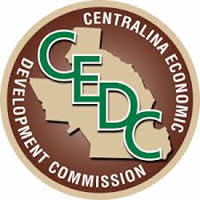Success Story: North Carolina Economic Development District Develops Strong Comprehensive Economic Development Strategies to Shape a Prosperous Future
May 2018 Newsletter
Robust, integrated regional planning is critical for successful economic development. The Centralina Economic Development Commission (CEDC), a 501(c)3 nonprofit affiliated with the Centralina Council of Governments (CCOG), covers a nine-county area around Charlotte, North Carolina. The entity, which serves as an EDA-designated Economic Development District (EDD), works to promote a diversified and innovative regional economic base, advocate for sustainable growth, support job development through expansion as well as retention and recruitment of business and industry. Central to the accomplishment of this mission is the regional Comprehensive Economic Development Strategy (CEDS).

“CCOG and CEDC committed to design [the CEDS] plan as a guide for the entire region,” said Ron Smith, CCOG Executive Director. “Business executives, students, workers and all our communities should find value in the strategic content, data and goals of the Prosperity for Greater Charlotte CEDS.”
In September 2012, CEDC completed a five-year, CEDS update entitled “Prosperity for Greater Charlotte.” With aligned support from a CCOG 2012-2015 HUD Sustainable Communities Grant project, “CONNECT Our Future,” CEDC accomplished an additional Jobs, Workforce and Education Alignment Strategy CEDS component focused on the regional talent pipeline. This innovative, unique addition created a guide for understanding the long-term demand for occupations and skills across the high-growth economic sectors of the Greater Charlotte Region, and will help bridge gaps within existing education and workforce training systems at both a regional and individual county level.
In 2015, EDA’s new CEDS Content Guidelines included the Centralina CEDS as an example of a CEDS that included strong, job-driven workforce development components. The innovative 2012-2017 “Prosperity for Greater Charlotte” CEDS also delivered strategic economic principles and data to the “CONNECT Our Future” project to achieve a 14-county bi-state regional growth scenario through 2040. This work was vetted by local government partners, education, business and community leaders in addition to the public, through 8,500 individuals providing input. The project was a truly unique conception of vertical integration and alignment of various jurisdictional planning processes to support community and economic collaboration with effective regional impacts.
Since the implementation of the 2012 CEDS, the following outcomes have resulted from the regional efforts established through the Prosperity for Greater Charlotte/CONNECT Our Future initiative:
- 2013-Jobs Workforce Education Alignment Strategy operationalized via a web portal “Career Headlight”; regionally connecting the K-12 system, colleges, and industry with adult and student job seekers and localized career information.
- 2013-Centralina CEDS incorporated into the NC Tomorrow initiative, developed by NC Commerce Department and NC COG Association to align statewide economic strategy across all 16 COGs.
- 2013-2016-Support to four annual global competitiveness summits of 400+ business, education and community leaders to discuss the region’s role in the global marketplace.
- 2014-2015-EDA Investing in Manufacturing Communities Partnership (IMCP) grant resulting in the Centralina Manufacturing Ecosystem Development Strategy (CMEDS) with value chain mapping and logistics\exports analytics at a regional and individual county level.
- 2016-Greater Charlotte Regional Freight Mobility Plan with the EDA funded innovative Economics and Land Use Appendix built upon the IMCP CMEDS data mapping and outcomes.

In late 2017, the CEDC delivered a new 2017-2022 “Prosperity for Greater Charlotte” CEDS which embraces the changing future but builds on the foundation developed in 2012. This CEDS focuses on the importance of facilitating strong regional collaboration between educators, nonprofits, government and the private sector in light of changing economic and business realities and their impacts on the region.
As the CCOG and CEDC begins implementing the latest regional CEDS, the organization continues to explore ways to be as innovative as possible with their planning. Key to that is connecting the CEDS to other regional planning to promote integrated, locally-led and comprehensive economic development planning that holds greater promise for driving economic prosperity for the entire region. For example, recognizing that successfully moving people and goods into, within, and out of the region will prove a key future economic lifeline and anchor for sustained quality of life and competitiveness, the CEDC has been able to connect the Regional 2050 Transit Plan Initiative led by the Charlotte Metropolitan Transit Commission to an upcoming Regional Transit Summit that builds on a prior EDA-funded Freight Mobility study.
“Our CEDS efforts have benefited from consistent unique collaboration allowing us to optimize information, maximize efficiency and achieve competitive effectiveness across the largest urban regional perspectives down to the smallest rural landscapes” said Mike Manis, CEDC President and CCOG Economic Director, “Since 2012 we have embraced an Albert Einstein quote that says, ‘We cannot solve our problems with the same thinking that we used to create them.’”
